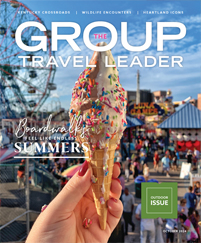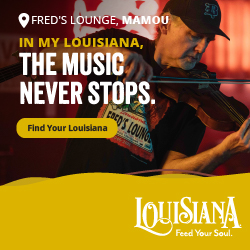There was a time when creativity wasn’t controlled by record companies, when artists sang without auto-tune, when image wasn’t a substitute for talent and when songs told stories instead of selling sizzle. Music was authentic and unspoiled. And the world’s best music was coming from right here in America.
The modern age of commercialized music might seem worlds away from the bluegrass, folk, blues, jazz and other music that made such a mark on American culture. But the days of authentic American roots music aren’t gone forever. That music continues to live and thrive in cities all around the country, often in the places where it first came of age.
For music lovers, enjoying some authentic live performances is one of the most exciting things about travel. Destinations around the country offer opportunities to connect with the heritage of American roots music through both historic interpretation and live performance.
Along the way, groups can meet some of the talented musicians who are helping to spearhead the resurgence of roots music in America.
Ozark Folk Center
Mountain View, Arkansas
Nestled in the wooded mountains of northern Arkansas, the Ozark Folk Center State Park preserves various aspects of Ozark folk culture. In addition to visiting a re-created Ozark village and watching artisans practice historic crafts, groups that visit the center have opportunities to enjoy authentic Ozark folk music.
“The roots music here has its origins from Scotland and the British Isles,” said Daren Dortin, the center’s music director. “Most of the settlers that came into this region brought that music with them. This part of the country didn’t have paved roads up until the 1940s, so the communities were isolated. As a result, a lot of the music that came here with early settlers went through three or four generations and remained unchanged because there were very few outside influences.”
When the folk center opened in the 1970s, part of its mission was to preserve and present that historic Ozark folk music to guests. From the time of its annual opening in April until it closes around Thanksgiving, the park presents daytime and nighttime folk music performances Wednesday through Saturday. Musicians use mostly acoustic instruments such as upright bass, mandolin, banjo and fiddle and often play their renditions of the traditional songs common in the area in the 19th and early 20th centuries.
“The daytime performances feature our house musicians, who are local and regional performers,” Dortin said. “They perform throughout the day in the craft village. The evening concerts in the auditorium feature a number of our house musicians, plus feature performers and folk music performers from Stone County, from Arkansas and from throughout the United States.”
After the evening performances, music lovers may want to stop by the courthouse square in Mountain View, where impromptu, informal jam sessions are known to go all day and late into the night.
Delta Blues
Clarksdale, Mississippi
Throughout the Mississippi Delta, music usually means blues, an art form that traces its roots to early agricultural practices in the area.
“America’s music was born in the fields and the land we know as the Mississippi Delta,” said Kappi Allen, tourism director for Visit Clarksdale Coahoma County. “Slaves would be sent into huge plantation fields to work the cotton, and they used field hollers as a way of communicating. That’s how the music was born.”
The blues continued to develop in the region with the addition of gospel music and other cultural influences, and musicians crafted instruments out of whatever they had on hand and played in whatever buildings were available. This led to the rise of “juke joints,” small, casual music venues, often in rural areas, still found throughout Clarksdale and the Delta.
Blues musicians eventually began traveling up and down the Mississippi River, introducing their new sound to audiences all over the world and making the blues one of the quintessential American art forms. But the Delta is still the home of the blues, and it offers authentic music experiences for visitors.
Groups can learn about the music’s history in detail by visiting Clarksdale’s Delta Blues Museum, which has exhibits on early bluesmen and features artifacts from some of the most famous fathers of blues. But a trip to the Delta would be incomplete without taking the opportunity to hear live blues at juke joints such as Red’s or Ground Zero.
“The clubs are vibrant, fun and real,” Allen said. “At Red’s, you can go in and meet Red himself. It’s part of the experience.
“You don’t even have to think that you like blues music to come here and enjoy what you will experience at the juke joints. When you leave, you’ll love the blues.”












